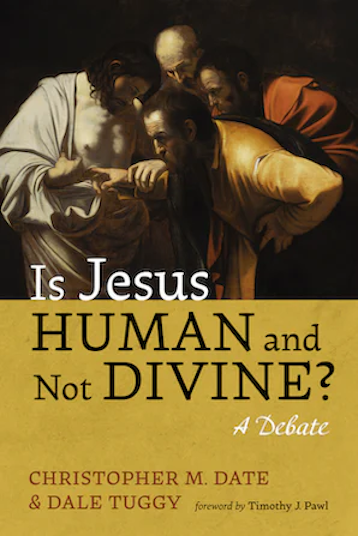
I’m delighted to say that my debate book with apologist Chris Date, which briefly went out of print, is now being published by Wipf and Stock. (Amazon link, Thriftbooks link).
Based on our face-to-face debate, we followed up by developing our arguments over a course of months, leading to a book where the conversation is deeper, wider, and overall better. The book is short, clearly argued, and it has an excellent Foreword by Dr. Timothy Pawl. It is endorsed by James Anderson, Robert M. Bowman, Jr., Thomas V. Morris, and Fred Sanders.
The answer to the question in the title, if we follow the New Testament, is: Yes! Here’s are two excerpts from my opening chapter:
In the New Testament, God and Jesus have many traits in common. Both are loving and forgiving, and are pursuing our salvation. Both are working to advance the Kingdom of God and to reveal God’s ways to us. They’re so alike that Jesus says, “Whoever has seen me has seen the Father.”1 And Paul says that Jesus is the “image of God.” But in the New Testament, God and Jesus also differ in many ways. Jesus was tempted; in contrast, God can’t be tempted. Jesus died on a cross, but the New Testament assumes that God has never died, because it implies that he is essentially immortal, in principle incapable of death. The New Testament is explicit that, like you and me, Jesus has a god over him, the one God. But the monotheistic, Jewish assumption is that the one true God is subject to no one. Jesus gets his calling, his commission, his power, and his authority from the one God. This is no surprise, since the “one like a son of man” in the prophecy of Daniel 7, which the first Christians understood to be the Messiah, is brought before God and given things which God has long had: “dominion and glory and kingship, that all peoples, nations, and languages should serve him.” A similar vision is found in Revelation 5, which portrays the exaltation of the risen Jesus. In contrast, since any cosmos there is must be created and ruled by God, God can’t in any sense get his position, power, or authority from anyone else.
The New Testament always and everywhere portrays Jesus as a real man, never as a “godman,” never as “God incarnate,” and never as “God the Son.” John has Jesus describe himself as “a man who has told you the truth that I heard from God.” In 1 Timothy, we read that “there is one God, and one mediator also between God and men, the man Christ Jesus.” And Paul sometimes compares and contrasts Jesus with Adam, as when he writes, “Just as we have borne the image of the man of dust [i.e. Adam], we will also bear the image of the man of heaven,” that is, Jesus, when like Jesus we believers are raised to immortality. Man, man, man—this is explicit; and these writers are not anxious to follow up with “and also divine” because that is not their view! The central and repeated thesis of all four Gospels is that Jesus is God’s Christ/Messiah, which implies being a human. It is unfathomable that this should be their explicit, main, emphatic point if their most important claim is really that Jesus is divine, or a godman, or “God in human form.” When they tell you their main thesis, it is something that Socinus can and did fully embrace.
